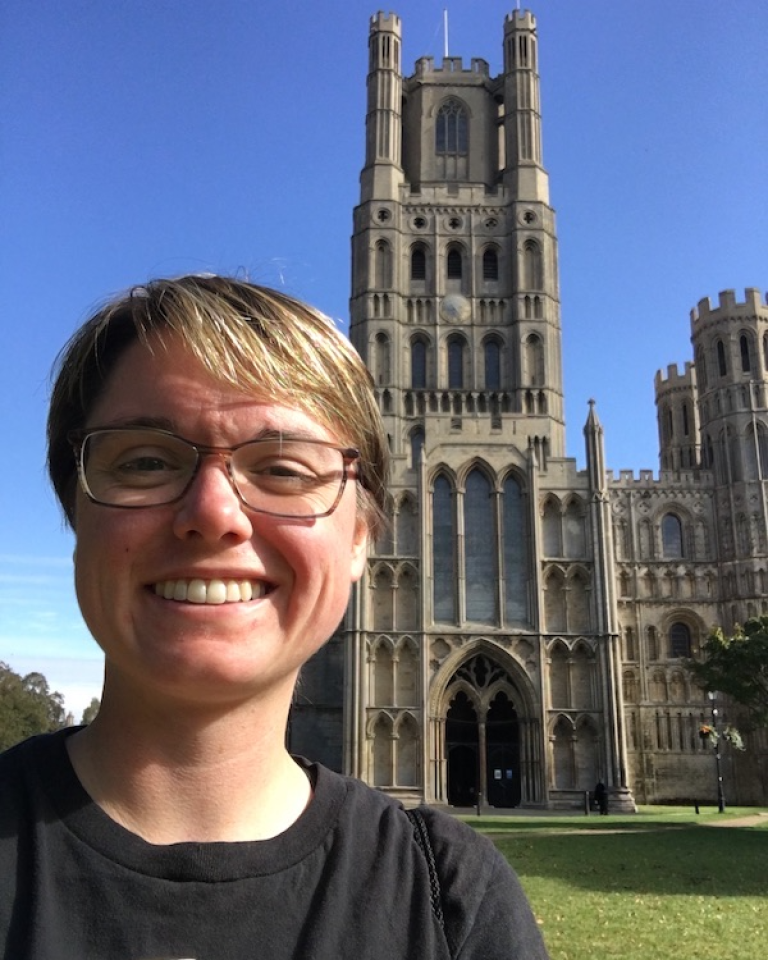Savannah Pine

Alumni Spotlight | Winter 2020-2021
Undergraduate KU major: History and European studies, minor in English
Graduation Year: 2017
Current occupation: PhD Student in Medieval History at the University of Cambridge
Research mentors while at KU: Prof. Steven Epstein, Dr. Dale Urie, Prof. Marie Grace Brown, and Prof. Jonathan Hagel
Describe the undergraduate research/creative experience that you had while at KU: I founded and was Editor-in-Chief of the Undergraduate Research Journal for the Humanities (URJH), a student-run, student-reviewed, and student-published annual academic journal for undergraduates at KU to publish their research in the Humanities. The URJH is now known as Zenith! The Undergraduate Research Journal for the Humanities has published a total of four issues, with a fifth on the way.
I also pursued and received Departmental Honors in both of my majors, History and European Studies.
Q: What do you think was the most important thing you learned while doing undergraduate research?
A: My research for my B.A. Honors History thesis was the important thing that I did while at KU because its topic became the basis for my Masters of Philosophy dissertation (MPhil completed at the University of Cambridge in 2019), for my current PhD research and dissertation (at the University of Cambridge), and for two forthcoming articles. It was thanks to doing this research for my B.A. Honors History that I found my speciality and knew for certain that I wanted to be an academic.
Q:What advice do you have for undergraduates who might be interested in doing research or creative scholarship?
A: My main advice is to not be afraid of receiving criticism from other people. My supervisor(s) and my best friend have read multiple drafts of all of my dissertations and articles. By having them read my material, I can make sure that my argument makes sense, especially to someone who is unfamiliar with the field as my best friend is, that I am using good evidence to support my argument, and that the paper reads rather well. Do not be afraid to ask others to read your work and to grow from their feedback.
Q: Do you use any of the skills or perspectives gained doing research in your current occupation? How so?
A: I use all of my research skills in my current occupation as a PhD student. Thanks to the Historian's Craft class that I took my first year at KU, I learned how to use special collections. This skill is rather important for a medieval historian whose main source material is manuscripts which are only physically accessible in a special collections library.
Q: Many undergraduate researchers are making decisions about what to do after they graduate from KU. Having been in those shoes, what do you know now that you wish you’d known then? Do you have any advice?
A: I applied to graduate school during my senior year at KU, but I did not get into any graduate program and moved home for a year. While I was angry and depressed about this, the year off did help me. Firstly, working convinced me that I really did want to be an academic because I missed doing research and writing about that research all the time. Secondly, the year off gave me the chance to read lots of scholarly material on my topic so that when I started my Masters program, I knew the historiography very well. Thirdly, since I did not get into any graduate schools in the US, I decided to apply to programs overseas and I am now in my third year of living and studying at the University of Cambridge. The proximity of Cambridge to Paris has made my work as a medieval French historian much easier.
My advice would be this: sometimes bad things will happen, sometimes your plans will not go the way you want, and you are allowed to be angry about it, but do not get discouraged. Obstacles will pop up, but finding a way to deal with them or finding ways to get around them will allow you to make the most of everything and help you get to where you want to be.